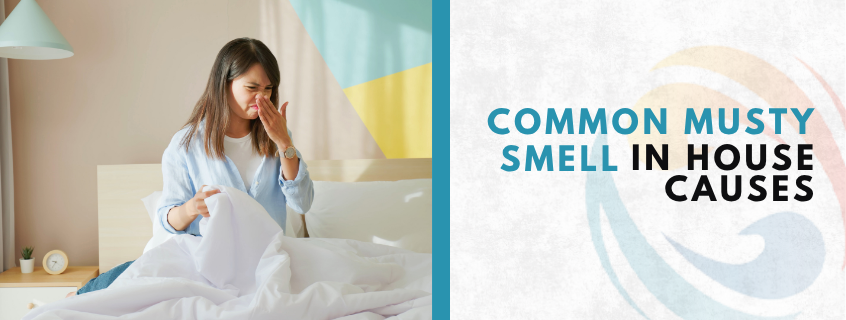
Have you ever walked into your home and noticed a strange, damp, stale smell that just won’t go away? That’s what most people describe as a “musty” odor. It’s not just unpleasant—it can also signal something deeper is going on in your home. From leaky pipes to forgotten basements, several culprits might be to blame.
This blog dives into the most common musty smell in house causes and what you can do to stop them. Whether you’re dealing with it right now or just want to be prepared, this guide will help you understand what’s going on behind the walls, under the floorboards, and in the air you breathe.
Let’s explore what causes those sneaky smells and how you can keep your home fresh and healthy.
Hidden Water Leaks That Breed Mold
One of the top musty smell in house causes is hidden water leaks. These leaks can start small—like a slow drip under your sink or behind the toilet—but over time, moisture builds up, especially in places you don’t see every day. That warm, damp space is the perfect home for mold and mildew, and that’s exactly what you’re smelling.
Water leaks often happen:
- Behind walls
- Under flooring
- Inside cabinets
- Around window sills
These leaks usually go unnoticed until they start to smell. The musty odor is the mold letting you know it’s there, and it’s time to take action.
Here’s what you can do:
- Check for damp spots on walls, floors, and ceilings.
- Use a moisture meter to detect hidden water.
- Fix leaks fast—even a small one can cause big problems.
- Dry the area thoroughly with fans or a dehumidifier.
- Clean moldy surfaces with a mix of water and vinegar, or call in the pros if it’s widespread.
Water damage, especially when it’s been sitting for a while, is no joke. If you catch a damp smell and see water stains or bubbling paint, don’t wait. You may need reliable water damage restoration help before things get worse.
Poor Ventilation That Traps Damp Air
A major reason people deal with unpleasant odors is poor airflow. It may not seem like a big deal, but air that doesn’t circulate can trap moisture and make rooms feel humid—and smell musty.
This is one of the more silent musty smell in house causes because it creeps up on you. You don’t need a flood or a broken pipe. All it takes is bad airflow in:
- Bathrooms without a working fan
- Laundry rooms without vents
- Closets and storage rooms with sealed doors
- Basements with little to no windows
Here’s how to fix it:
- Open windows regularly to let fresh air in.
- Install exhaust fans in bathrooms and laundry areas.
- Use ceiling fans to help air movement.
- Place dehumidifiers in rooms that feel damp.
Also, don’t forget to check vents and air filters. Dust and debris can clog systems, making ventilation worse. A little fresh air goes a long way toward getting rid of musty smells and stopping mold from growing.
If you live in an area near the coast or one that’s often humid, like Playa Del Rey, it’s even more important to stay on top of airflow. Humid coastal air can sneak into your home and turn any poorly ventilated space into a mold hotspot.
Old Carpets and Upholstery That Absorb Odors
Carpet feels nice underfoot, but over time, it can trap more than just crumbs. Old carpets and upholstered furniture are sponges for smells. They soak up spills, pet odors, and especially moisture. And when that happens? They become one of the leading musty smell in house causes.
Even the best vacuum can’t suck out trapped mold spores or mildew growing deep in the padding. If your house still smells musty after cleaning, your carpet could be the culprit.
Here are signs your carpet might be causing trouble:
- A damp, stale smell even after vacuuming
- Stains that keep coming back
- Allergy symptoms like sneezing or itchy eyes
What to do about it:
- Steam clean carpets at least once a year.
- Use baking soda to absorb surface odors.
- Consider replacing old carpet that’s more than 10 years old.
- Switch to hard flooring like tile or wood in damp areas.
Don’t forget about rugs, curtains, and furniture. Fabric loves to hold onto musty smells. Clean or replace them regularly to keep the air in your home fresh and breathable.
Types of Odor-Trapping Materials at Home
| Material | Odor Risk Level | Solution |
| Carpet | High | Steam clean or replace |
| Curtains | Medium | Wash monthly |
| Upholstered sofas | High | Use fabric-safe cleaners |
| Area rugs | Medium | Shake outdoors, spot clean |
| Foam cushions | High | Air out in the sun or replace |
Damp Basements and Crawlspaces
Basements and crawlspaces are notorious for being musty. They’re often cool, dark, and damp—the ideal environment for mildew and mold. And yes, they’re one of the top musty smell in house causes people overlook.
Whether it’s groundwater seeping in or humidity from poor insulation, the air down there tends to stay stale. Even a finished basement isn’t immune if the moisture levels aren’t managed.
If your basement has a musty odor, try this:
- Seal cracks in the foundation or walls.
- Install a sump pump if flooding is an issue.
- Use a heavy-duty dehumidifier, especially in summer months.
- Lay down vapor barriers in crawlspaces to block moisture.
And don’t forget to check under the stairs, storage bins, or old boxes. Cardboard absorbs moisture and can grow mold quickly. Replace it with plastic containers to keep the space dry and clean.
Adding a fan or air purifier can also help circulate air in closed-off spots. If the smell lingers, you may need to bring in experts like those who handle professional water restoration to assess the damage beneath the surface.
Forgotten Laundry or Wet Towels
We’ve all done it—left a wet towel in the corner or forgot a load of laundry in the washer overnight. The result? That funky, musty scent that hits you when you walk by. While it might seem like a small mistake, this is another one of those musty smell in house causes that happens more often than people admit.
Mold and mildew don’t need a flood. They just need moisture and a few hours of warmth.
Here’s how to stop the smell:
- Always dry towels completely after use.
- Don’t leave wet clothes sitting in the washer.
- Wash bath mats weekly.
- Clean your washer’s gasket and leave the door open between loads.
A front-load washing machine with a rubber seal can trap water and become a breeding ground for mildew. Keep it clean, and run a vinegar rinse every month to remove buildup.
If you start noticing your laundry room smells damp or sour often, it might be time to inspect the walls and flooring for water damage.
HVAC Systems That Harbor Mold
Your HVAC system—your heating, ventilation, and air conditioning—is supposed to keep your air clean and comfortable. But if it’s not maintained properly, it can turn into one of the sneakiest musty smell in house causes.
Air ducts, especially if they’ve never been cleaned, can hold:
- Dust
- Mold spores
- Pet hair
- Moisture buildup
When you turn on your AC or heat, all of that gets pushed into your home.
To prevent this:
- Change air filters every 1–2 months.
- Clean ducts every 3–5 years.
- Schedule yearly inspections with a certified technician.
- Use a HEPA filter for better air quality.
Also, check for leaks in the ductwork. Leaky ducts can pull in damp air from basements or attics, spreading that musty smell all over the house.
HVAC issues can be tricky because the smell seems to come from everywhere at once. But if it’s strongest when the system kicks on, chances are that’s your source.
A Quick Recap: Top Musty Smell in House Causes
Let’s make it easy to remember the key musty smell in house causes with a description list:
Water Leaks:
Hidden drips behind walls or under sinks cause dampness that mold loves.
Poor Ventilation:
Trapped air and humidity make rooms feel sticky and smell musty.
Old Carpets/Furniture:
Fabric holds onto smells from spills, moisture, and everyday use.
Damp Basements:
Cool, dark spaces with little airflow are perfect for mildew.
Forgotten Laundry:
Wet towels or clothes create mold fast when left alone.
HVAC Mold:
Air systems push stale, moldy air through your entire home if not cleaned.
What Should You Do If the Smell Won’t Go Away?
Sometimes, the musty smell is just too stubborn. You’ve cleaned, aired out, and dehumidified—but it still lingers. That’s a sign you may need professional help.
Especially if the odor is accompanied by:
- Allergy symptoms
- Visible mold patches
- Peeling paint or wall bubbling
- Warped floors
That’s when it’s time to reach out to experts. A trained restoration team can inspect areas you can’t see—like behind drywall or under floorboards—and fix the root problem.
Homes in humid or coastal areas are more prone to these issues. If you’re in a spot like Playa Del Rey and are experiencing these persistent odors, don’t hesitate to get a full moisture assessment.
Final Thoughts: Keep Your Home Fresh and Must-Free
No one wants to live in a house that smells like a damp basement. But the good news is: musty smell in house causes can almost always be fixed—if you know what to look for.
Whether it’s a small water leak, old carpet, or a hidden issue in your HVAC, the first step is paying attention to the signs. Follow the tips in this article, keep things dry and well-ventilated, and don’t ignore smells that come back again and again.
And when in doubt? Bring in professional restoration experts who know how to uncover what’s behind the walls. Fast action can make the difference between a quick fix and a costly repair.Got questions or suspect a hidden problem? You can start by reaching out for a full property assessment through this restoration team that has the tools and experience to help you breathe easier again.
Frequently Asked Questions About Musty Smells at Home
Why does my house suddenly smell musty even though I clean regularly?
A sudden musty smell can come from hidden moisture, like a slow leak or poor ventilation. Even clean homes can develop mold if air isn’t circulating well.
How do I know if the musty smell is caused by mold?
If the odor is persistent, damp, and earthy—and worse in certain rooms—it’s likely mold. You might also see signs like discoloration, peeling paint, or allergy symptoms.
Can old carpet really be the reason for a musty odor?
Yes, carpets trap moisture and odors deep in the fibers, especially if they’re old or in damp areas. Regular steam cleaning or replacement can help eliminate the smell.
What’s the fastest way to get rid of musty odors in my home?
Use fans and dehumidifiers to dry out the space, clean any moldy surfaces, and improve ventilation. Focus on the source of moisture to stop the smell from returning.
Do I need professional help if the musty smell doesn’t go away?
Yes, if the smell lingers after cleaning and drying, you may have hidden mold or water damage. Professional restoration can detect deeper issues and prevent health risks.



